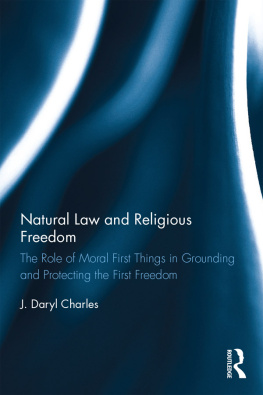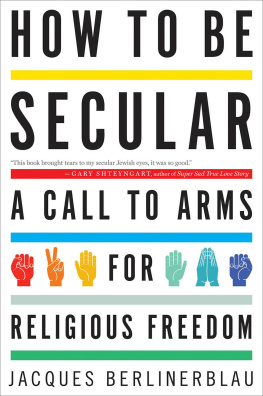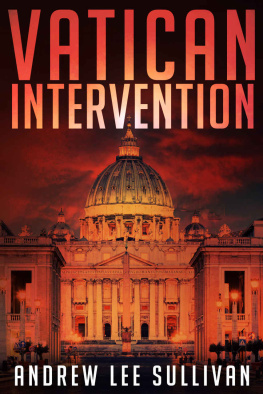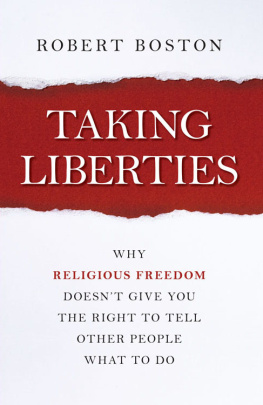Winnifred Fallers Sullivan - The Impossibility of Religious Freedom
Here you can read online Winnifred Fallers Sullivan - The Impossibility of Religious Freedom full text of the book (entire story) in english for free. Download pdf and epub, get meaning, cover and reviews about this ebook. year: 2018, publisher: Princeton University Press, genre: Religion. Description of the work, (preface) as well as reviews are available. Best literature library LitArk.com created for fans of good reading and offers a wide selection of genres:
Romance novel
Science fiction
Adventure
Detective
Science
History
Home and family
Prose
Art
Politics
Computer
Non-fiction
Religion
Business
Children
Humor
Choose a favorite category and find really read worthwhile books. Enjoy immersion in the world of imagination, feel the emotions of the characters or learn something new for yourself, make an fascinating discovery.
- Book:The Impossibility of Religious Freedom
- Author:
- Publisher:Princeton University Press
- Genre:
- Year:2018
- Rating:4 / 5
- Favourites:Add to favourites
- Your mark:
- 80
- 1
- 2
- 3
- 4
- 5
The Impossibility of Religious Freedom: summary, description and annotation
We offer to read an annotation, description, summary or preface (depends on what the author of the book "The Impossibility of Religious Freedom" wrote himself). If you haven't found the necessary information about the book — write in the comments, we will try to find it.
The Impossibility of Religious Freedom — read online for free the complete book (whole text) full work
Below is the text of the book, divided by pages. System saving the place of the last page read, allows you to conveniently read the book "The Impossibility of Religious Freedom" online for free, without having to search again every time where you left off. Put a bookmark, and you can go to the page where you finished reading at any time.
Font size:
Interval:
Bookmark:
The Impossibility
of Religious Freedom
of Religious Freedom
WINNIFRED FALLERS SULLIVAN
New Edition
With a new preface by the author
PRINCETON UNIVERSITY PRESS
PRINCETON AND OXFORD
Copyright 2005 by Princeton University Press
Preface to the new edition 2018 by Princeton University Press
Published by Princeton University Press,
41 William Street, Princeton, New Jersey 08540
In the United Kingdom: Princeton University Press,
6 Oxford Street, Woodstock, Oxfordshire OX20 1TR
All Rights Reserved
New paperback edition, with a new preface by the author, 2018
New paper ISBN: 978-0-691-18095-3
The Library of Congress has cataloged the last edition of this book as follows:
Sullivan, Winnifred Fallers, 1950
The impossibility of religious freedom / Winnifred Fallers Sullivan.
p. cm.
Includes bibliographical references and index.
ISBN 0-691-11801-9 (hardcover : alk. paper)
1. Warner, MarinaTrials, litigation, etc. 2. Boca Raton (Fla.)Trials, litigation, etc. 3. CemeteriesLaw and legistationFlorida. 4. Freedom of religionUnited States.
I. Title.
KF228.W353S85 2005
342.7308'52dc22 2004058685
British Library Cataloging-in-Publication Data is available
This book has been composed in Janson
Printed on acid-free paper.
press.princeton.edu
Printed in the United States of America
1 3 5 7 9 10 8 6 4 2
For my mother
In the preparation of this book, my many debts to the following are both professional and personal: Jeremy Biles, Alexandra Brown, Spencer Dew, Sandy Dowler, Margaret Fallers, Susan Gilles, Hillel Gray, Philip Hamburger, Stanley N. Katz, Hans Kippenberg, Beth Lamanna, Cynthia Gano Lindner, Martin E. Marty, Heather Miller, Helen Scharbach Newlin, M. Sandford Norbeck, Kay Read, Frank Reynolds, Richard A. Rosengarten, Barry Sullivan, George Sullivan, Lloyd Sullivan, Brigitta van Rheinberg, James Boyd White, Robert Yelle, and the anonymous reviewers. But, most importantly, my friend, colleague, and teacher, Frank Reynolds. I am very grateful to all of them for their counsel and support. I am also grateful to Washington and Lee University and the University of Chicago for the institutional support they have provided.
Further, I owe a posthumous debt, personal and professional, to Philip B. Kurland, who saw earlier than most, and with greater clarity, the issues with which this book is concerned.
All of the materials used in the preparation of this book are a matter of public record.
(Following )
Note: All of the photographs dated 2004 were taken by the author. The photographs taken in 1999 were entered into evidence at the trial.
Rightness in the end is the fit of the result to the facts, compiled with the possibility of generalizing the result. No formula will produce it.
John T. Noonan, Jr.
Though the Beth Din is rapidly disappearing, I believe it will be reinstated and evolve into a universal institution.
Isaac Bashevis Singer
INTRODUCTION
What makes law successful? John Noonan, judge of the United States Court of Appeals for the Ninth Circuit, and Isaac Bashevis Singer, Nobel prize winning novelist, each pointed in their work to the ways in which justice demands laws fitness to everyday life.
I am not alone in this view. Indeed, religious freedom in the United States today seems to many to have become almost unrecognizable. More than a quarter century after the U.S. Supreme Courts 1990 decision in Employment Division v Smith,
This book describes one of the first state RFRA cases, brought in 1998 on behalf of a group of Florida residents who were complaining that the City of Boca Raton had, in the words of the statute, substantially burdened the exercise of their religion by forbidding the erection and maintenance of small home-made shrines on the graves of their dead relatives in a city cemetery. Today twenty-one states boast their own RFRA laws and the recent U.S. Supreme Court extension of the federal RFRA statute to corporations in the Hobby Lobby decision
I wrote The Impossibility of Religious Freedom about fifteen years ago after participating as an expert witness in the trial it concerns. I intended the book as a teaching book, providing resources in the appendices to allow students to think through on their own the real challenges facing courts in these kinds of cases. I have been gratified by its reported success in the undergraduate classroom. But I hear also from those who teach it that while it continues to be a distinctive resource, they spend more and more time providing an update and filling out context, as well as fielding questions about my own position in regard to these issues. The book has also been a bit of a touchstone for some in a political philosophical debate about how legally to protect the freedom of religion and belief.
In this preface to the second edition, I offer a brief update to the state of the law in the United States, set the U.S. case in the larger frame of the global politics of religious freedom today, discuss the evidentiary challenges posed by these cases, explaining why I have sworn off testifying, and, finally, note the now flourishing and fascinating global field that is emerging on religion, law, and politics, and its relationship to debates about secularism and secularization.
U.S. LEGAL UPDATE
Notwithstanding its name and the advertised intentions of its drafters and promoters, it is important to understand that the Religious Freedom Restoration Act was an act of legal innovation, not an act of restoration. While the federal RFRA promised to return the state of the law to that which had existed before the US Supreme Courts 1990 Smith decision, what it, and its successors, did instead was to greatly expand what had previously been a very limited exemption. Justice Antonin Scalias opinion for the majority in Smith had held that the free exercise clause of the First Amendment to the U.S. Constitution does not in fact mandate a religious exemption, or accommodation, from neutral laws of general application that impinge on the activities of religiously motivated people, even if such laws effectively outlaw acts that are understood by them to be religious dutieseven sacraments. The Smith case concerned an asserted right to exemption from the Oregon narcotics laws for the religious use of peyote. While there had been a brief period between the Courts 1963 decision in Sherbert v. Verner and its decision in Smith when the Court appeared in a small number of cases to recognize a generalized right to an exemption, Scalia made clear in his careful re-reading of prior cases that such a generalized exemption had never been the law. Sherbert and each of its successors, he said, were actually cases recognizing hybrid rights, religious exercise plus another right, such as the right of parents to direct their childrens education.
It has in fact never been the case in the United States that, in the words of RFRA, those substantially burdened in the practice of their religion could force all government officials, local, state, and federal, to accommodate their practice unless government could show a compelling state interest and use of the least restrictive means. There have indeed been regular accommodations for some religiously motivated dissenters, mostly legislative, such as the accommodation for the ritual use of alcohol by Catholics and Jews during Prohibition and laws permitting exemption on the ground of conscientious objection to military serviceas well as occasional judicially mandated accommodationsbut they were very rare. Others have fared less well. Indeed, mostly it has been the case in the US that minorityand majorityreligious communities, immigrant and
Next pageFont size:
Interval:
Bookmark:
Similar books «The Impossibility of Religious Freedom»
Look at similar books to The Impossibility of Religious Freedom. We have selected literature similar in name and meaning in the hope of providing readers with more options to find new, interesting, not yet read works.
Discussion, reviews of the book The Impossibility of Religious Freedom and just readers' own opinions. Leave your comments, write what you think about the work, its meaning or the main characters. Specify what exactly you liked and what you didn't like, and why you think so.

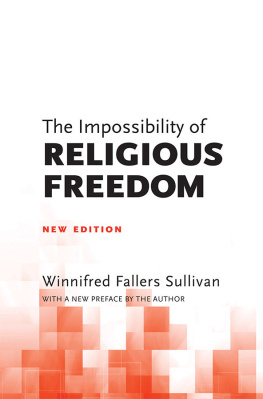

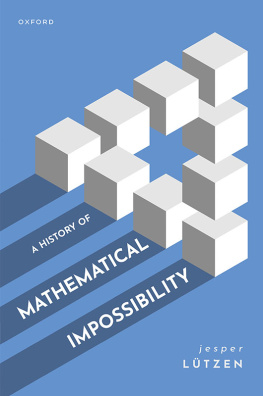
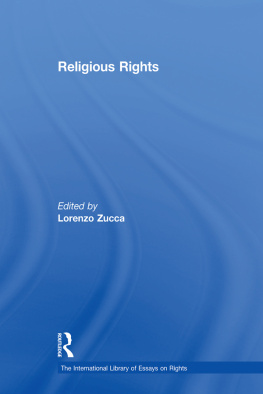
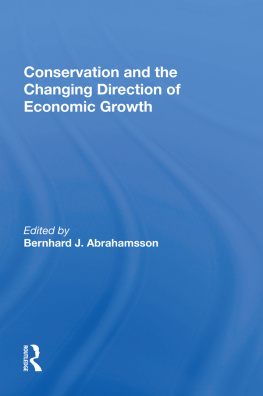
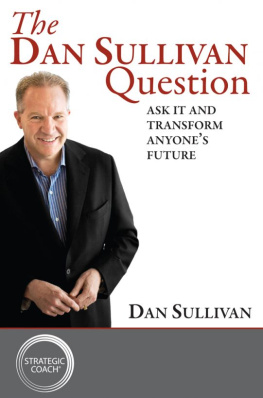
![Blackford - Freedom of religion [and] the secular state](/uploads/posts/book/167779/thumbs/blackford-freedom-of-religion-and-the-secular.jpg)
